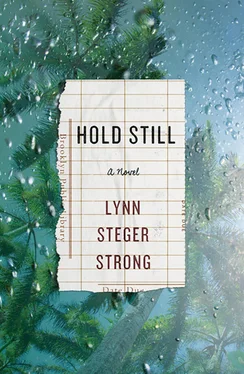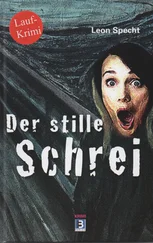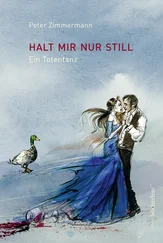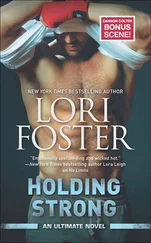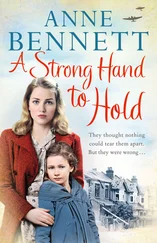“Dad’s going to hate me.”
The air burns Maya’s throat, cold and sharp, then sluices through her lungs. She finally looks at him. His face looks round and small.
“He won’t be able to handle two fucked-up kids.”
“Fuck Dad, Benny,” she finally says.
He smirks and turns to her. “Right,” he says.
He picks up speed and she stays with him. Her whole body feels warmer now, firmer and more sure. They pass a skateboard park and a playground, a row of tennis courts. They can hear the whoosh of the first smattering of cars out on the West Side Highway. There’s a thin layer of mist hovering over the whole city still.
“Do you want to take the semester?”
“I just feel like I’m wasting everyone’s time,” he says. “I don’t know what I’m doing there.”
“I think that’s what college is for, though,” Maya says. Her children are finally the age she’d always looked toward: the age of her students, whom she’s always loved, whom she’s nearly always known how to help.
“But I don’t like anything,” he says.
“Benny. .” She tugs his arm and they turn off the path just as the signal turns green and they cross into the city. They’re all the way west, just south of Times Square, but the streets are still quiet this early in the morning. They pass storage warehouses, then apartments, billboards for Broadway plays, then lines of theaters, finally the fluorescent flashing lights of the main square. The morning shows are getting started up in some of the glass-walled buildings. Cameras glint and anchors settle into chairs. Cars are no longer allowed here and the streets are filled with flimsy metal chairs and tables. Everything around them is too bright and too big.
“I miss. .” he begins. “I miss it here,” he says.
She wants to ask him to be more specific. Does he miss them? Does he miss the city? Was the quiet as awful as Maya had feared?
“Benny, I think it’s fine, okay? I just don’t want you to feel stuck here,” she says. This isn’t right exactly. “I don’t. .” She’s not sure she’s capable of staying functional for him.
“Dave says I can come help him this semester. He says he’ll pay me to be his assistant coach.”
“All right,” says Maya. “That sounds. .” They pass Grand Central, then go south a block to get off Forty-second Street. They pass beautiful apartments and hotels.
Her whole life, September’s served as her beginning. May has meant the end. She likes the sound of the word semester , how it cuts the school year into halves and the whole year feels more surmountable somehow. She doesn’t want him running back and forth, reacting and escaping. She’s not sure what else there is to do.
“If it’s what you think you need to do,” she says, “you should.”
“Can you tell him?”
Him is Stephen. Him is Dad.
Maya nods. “Sure, Benny,” she says. “I can tell him.”
She stays with her son all the way down the East Side of the island, up into Chinatown and along the bike path on the Manhattan Bridge. He slows down a bit once they get back into Brooklyn, and Maya’s grateful. They take the most direct route, straight up Flatbush, then right just before the park. They’ve covered probably twelve or thirteen miles in a little over ninety minutes. It’s only when they get to their stoop and stop running that Maya feels the weight of what they’ve run, the tightening of her muscles and the rush of lactic acid. She grabs the wrought-iron rail that runs along each side of the steps that lead to the apartment and tries to keep her breathing steady as she watches her son begin to stretch.
“I’m old,” she says. She has hold of both her knees, but turns to face him.
Ben laughs and sets his right foot up on the highest step, leaning over it, then does the same with his left. He stops the timer on his watch. “Still pretty impressive,” he says.
He rests his hand briefly on her back.
“Stretch,” he says.
She shakes her head and positions her feet as he has. She leans forward, feeling that first satisfying pull of her muscles loosening.
“You’ll be a wonderful coach,” she says.
“How the fuck did we get this so wrong?” says Stephen. Ben’s out with friends. She and Stephen sit with cartons of take-out Thai food. They have a daughter they’ve locked up in rehab, and a son who’s dropping out of college. Maya has decided to bring Ben up first.
“Two kids who’ve fucked up so royally,” Stephen says. His knuckles look sharp and white on top of his chopsticks. They hover over a large plastic container of greasy pork and vegetable pad thai.
“Stephen.” She watches a noodle split between his teeth.
“Should I just accept this? One of us has to actually face all this. To parent , Maya. He’s a child.”
She picks up her chopsticks and flips them back and forth through her fingers. She’s left-handed and they make a hollow knocking sound against her simple white gold wedding band. “He’s nineteen.”
“Exactly. He has no idea what he’s doing. You can’t get a job busing tables without a college degree.”
“Please, just give him a little time. They were so close, you know? We should have realized how much all of this affected him. I think it’s admirable, that he acknowledges he’s not getting anything from school.”
“Are you serious? We must have made them this way, you know. It can’t have been easy, being so wonderful all the time, having everything given to you, having everything come so easily.”
“Just give him a break. He’ll come back on his own.”
“From what? He needs a kick in the ass, is what he needs. You let them think they deserved things without having to work for them. You’re so committed to your catering to them, giving everything you could think to give to them, but then you were the one who would disappear. I never got so scared or sad or whatever it was you got that I needed breaks from parenting.”
Once, when Ben was two and El was four, she’d flown down to Florida for three weeks, just to be quiet for a while, just to be alone with the water and her books and not have to love quite as much as she did when her kids were there. She escaped sometimes, either to her study, or right there in front of them. She curled into herself for fear of how all that love — more than she could feel she had a hold of — might inflict itself in ways she hadn’t meant.
“That’s because you weren’t around as much as I was.”
“Because I was working, remember? You wanted them to feel loved the way you didn’t. You wanted to right all that shit with your dad. You taught them this.”
Maya’s father. Ice clinking on the thick highball glass he always carried, filled with scotch when she was younger, then gin later, the brush of his hand cold and quick across her cheek, the meticulousness with which he dressed each morning, his thumb and forefinger — meaty, hardened from working closely with the contractors at the houses that he bought and sold — working carefully to button each side of his shirt collar, dark socks and the musty heavy leather smell of his newly polished shoes.
Her mother had left them, three months, nearly to the day, after Maya was born. She knew this through the one letter that her mother had written to her father. She’d dated it, in some odd attempt at propriety, in the moment that she’d absconded in the face of life’s demands. The letter said that she was sorry. It said this was not the life she wanted. Maya wasn’t. Maya had understood then that she was something people had to work to want. Her father had taken on the role of dad most earnestly. Though he was awkward, though he was uncomfortable often around his girl, he did adore his daughter; he adored her in the bumbling self-centered way that sad and callow men love their little girls.
Читать дальше
